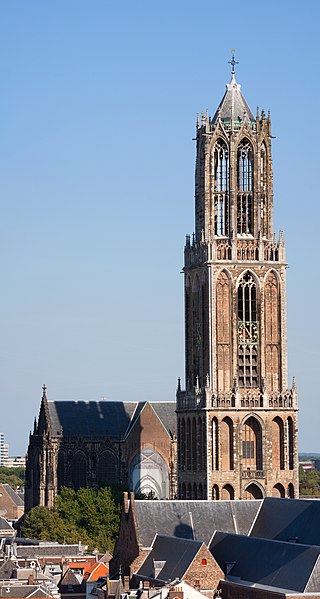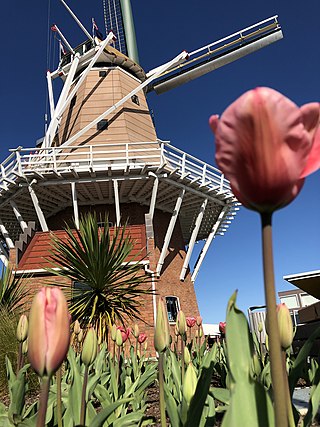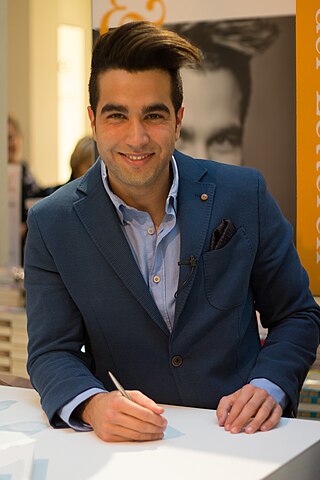Related Research Articles

Demographic features of the population of the Netherlands include population density, ethnicity, education level, health of the population, economic status, religious affiliations and other aspects of the population.
GroenLinks is a green political party in the Netherlands.

Islam is the second largest religion in the Netherlands, after Christianity, and is practised by 5% of the population according to 2018 estimates. The majority of Muslims in the Netherlands belong to the Sunni denomination. Many reside in the country's four major cities: Amsterdam, Rotterdam, The Hague and Utrecht.

The Australian continent was first settled when ancestors of Indigenous Australians arrived via the islands of Maritime Southeast Asia and New Guinea over 50,000 years ago.

Paul Rosenmöller is a Dutch politician and former trade unionist and television presenter. Between 1989 and 2003, he was member of the Dutch House of Representatives for GroenLinks and was party leader from 1994. Rosenmöller is a member of the Senate for GroenLinks since June 2019 and leader of GroenLinks–Labour Party in the Senate since June 2023.

Religion in the Netherlands was historically dominated by Christianity between the 10th and 20th centuries. In the late 19th century, roughly 60% of the population was Calvinist and 35% was Catholic. Since then, there has been a significant decline in both Catholic and Protestant Christianity, with Protestantism declining to such a degree that Catholicism became the foremost form of the Christian religion. The majority of the Dutch population is secular. Relatively sizable Muslim and Hindu minorities also exist.
Somalis in the United Kingdom include British citizens and residents born in or with ancestors from Somalia. The United Kingdom (UK) is home to the largest Somali community in Europe, with an estimated 108,000 Somali-born immigrants residing in the UK in 2018 according to the Office for National Statistics. The majority of these live in England, with the largest number found in London. Smaller Somali communities exist in Birmingham, Bristol, Manchester, Liverpool, Leicester, Milton Keynes, Sheffield and Cardiff.

Hinduism is The third largest religious group in the Netherlands, after Christianity and Islam; representing about 1.0% of the Dutch population in 2019. After the United Kingdom and Italy, the third largest Hindu community of Europe lives in the Netherlands. There are between 150,000 – 200,000 Hindus currently living in the Netherlands, the vast majority of who migrated from Suriname – a former Dutch colony in South America. There are also sizable populations of Hindu immigrants from India, Sri Lanka, Nepal, and Afghanistan, as well as a smaller number of Western adherents of Hinduism-oriented new religious movements.
Turks in the Netherlands refers to people of full or partial Turkish ethnicity living in the Netherlands. They form the largest ethnic minority group in the country; thus, the Turks are the second-largest ethnic group in the Netherlands after the ethnic Dutch. The majority of Dutch Turks descend from the Republic of Turkey; however, there has also been significant Turkish migration waves from other post-Ottoman countries including ethnic Turkish communities which have come to the Netherlands from the Balkans, the island of Cyprus, as well as from other parts of the Levant. More recently, during the European migrant crisis significant waves of Turkish minorities from Syria and Kosovo have also arrived in the Netherlands. In addition, there has been migration to the Netherlands from the Turkish diaspora; many Turkish-Belgians and Turkish-Germans have arrived in the country as Belgian and German citizens.
Moroccans in the Netherlands are Dutch citizens of Moroccan origin. They consist of immigrants from Morocco and their descendants, and form the second largest ethnic group in the Netherlands.
The issue of the universal basic income gained prominence on the political agenda in Netherlands between the mid-1970s and mid-1990s but it has disappeared from the political agenda over the last fifteen years.
Dutch Afghans are Dutch citizens and non-citizen residents born in, or with ancestors from, Afghanistan. In 2015 there were 44,000 Dutch Afghans, which form one of the largest Afghan diaspora communities as well as one of the main Asian communities in the Netherlands. Most of the first generation population originally settled in the Netherlands between 1992 and 2001.
Somalis in the Netherlands are residents or naturalized citizens of the Netherlands who are of Somali ancestry. They form one of the larger Somali communities in Europe and amongst the second largest African foreign community in the Netherlands. The Somalis form the second largest African community in The Netherlands and are one of the fastest growing communities.

Dutch New Zealanders are New Zealanders of Dutch ancestry. Dutch migration to New Zealand dates back to the earliest period of European colonisation. The 2013 census recorded 19,815 people born in the Netherlands and 28,503 people claiming Dutch ethnicity.
Indians in the Netherlands are residents of Indian origin in the Netherlands. The majority of the people of Indian descent in the Netherlands are of Indo-Surinamese origin. More recently the flow of emigrants from India has increased, especially information technology professionals, as well as from Guyana and Trinidad and Tobago, mostly those married to Indo-Surinamese.

Mano Bouzamour is a Dutch novelist and columnist. He scored a stunning success with his first novel, De belofte van Pisa, in which he described his childhood and youth as the son of immigrants in the Netherlands.

We Are Here is a collective of migrants based in Amsterdam, the Netherlands, which campaigns for human rights for its members and all undocumented migrants. The asylum seekers have in many cases had their applications to remain in the Netherlands denied but they either cannot go back or refuse to return to their country of origin. They demand access to social services such as medical care and housing. The group formed in 2012 and by 2015 contained over 200 migrants from around 15 countries.
In the run-up to the 2023 Dutch general election, various organisations carried out opinion polling to gauge voting intentions in the Netherlands. Results of such polls are displayed in this list.
GroenLinks–PvdA, alternatively PvdA–GroenLinks, or GreenLeft-Labour in English, is an alliance between GroenLinks (GL) and the Labour Party (PvdA) in the Netherlands. The political alliance was founded at the national level by party leaders Lilianne Ploumen and Jesse Klaver during the 2021–2022 Dutch cabinet formation, whereas local alliances between the two parties had already been formed in prior years. The two parties formed a joint parliamentary group in the Provincial Council of Zeeland in 29 March 2023, then formed a joint group in the Senate following the 2023 Dutch Senate election, and formed a joint group in the House of Representatives on 27 October 2023.
References
- ↑ "Jennifer Hamm :: Freelance Journalist". Archived from the original on 2017-01-16. Retrieved 2008-01-15.
- ↑ :: Safara.info :: Iraqi Embassy in the Hague ::
- 1 2 3 4 5 6 7 8 9 "Study Report of the Iraqi Community in the Netherlands". nsv-sociologie-facta.nl. Retrieved 2008-02-14.[ permanent dead link ]
- ↑ Iraqi migration to the Netherlands
- ↑ – Voorman Denk van de balie in stadhuis naar een raadszetel
- ↑ – Politiek Café Irak; het verschuiven van poppen helpt niet, er moet een ander spel komen
- ↑ – “Ik kan niet tegen onrecht, daarom demonstreer ik”
- ↑ – GroenLinks - HAIDAR AL IBRAHIM "Creatief en hard werken voor een betere morgen"
- ↑ – GroenLinks - Samir Bashara
- ↑ – Samir Bashara moet Nieuw-West veilig en gelukkig maken: ‘Dit kost een hele generatie’
- ↑ "Leisure & Entertainment - March 2003". Archived from the original on 2007-05-23. Retrieved 2007-08-31.
- ↑ "Iraqi-Dutch fashion designer". Archived from the original on 2007-07-18. Retrieved 2008-04-09.
- ↑ "Future TV". Archived from the original on 2008-04-06. Retrieved 2008-04-09.
- ↑ FMD – Profile of fashion model viola haqi
- ↑ WISE Archived 2009-05-24 at the Wayback Machine